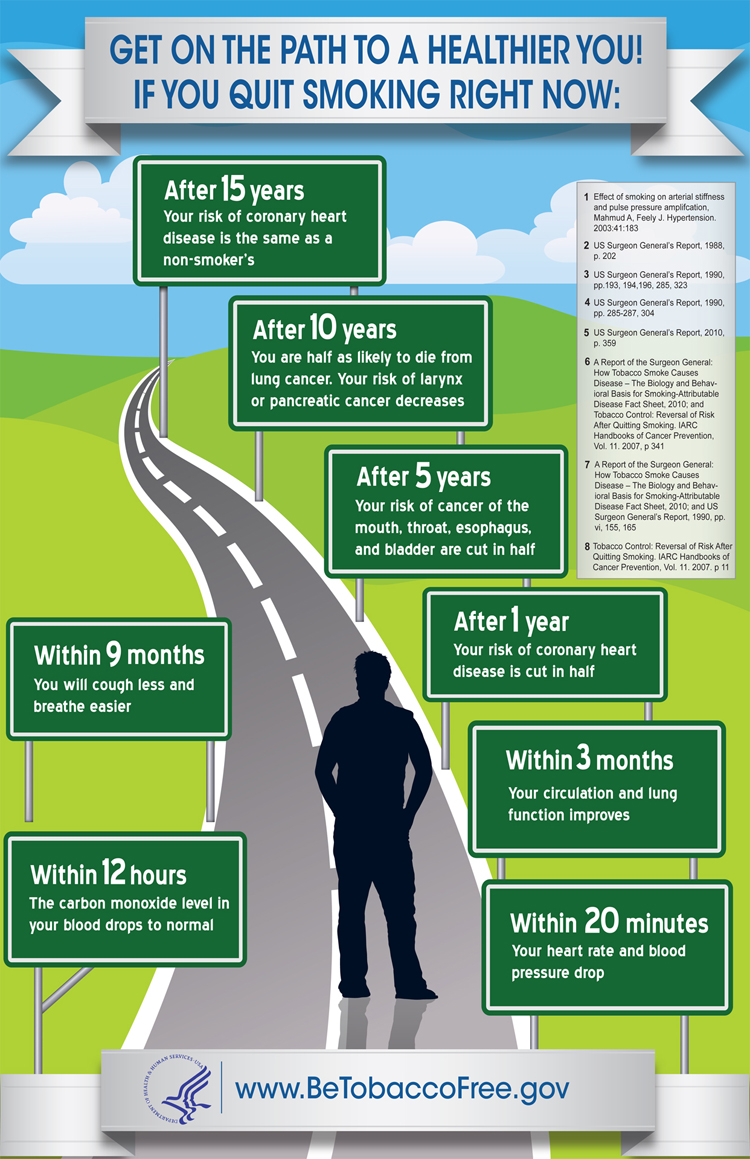Tobacco Cessation
It isn't easy to quit tobacco—but it is possible!
There are many resources to help you quit tobacco including prescription medications, over the counter therapies, coaching, online programs and more. Engaging with tobacco cessation medication like NRTs, in conjunction with behavioral coaching or counseling, has been shown to be twice as effective as using NRT or counseling alone.
Dartmouth is a Tobacco-Free Community
Dartmouth is committed to providing a healthy environment for our community members to thrive. Smoking just four cigarettes can give a person a 90% chance of becoming addicted. Tobacco use causes more deaths in the U.S. than AIDS, automobile accidents, homicides, suicides, drug overdoses and fires combined. Tobacco use is a known risk factor for a variety of life-threatening diseases, and growing evidence links smoking cigarettes with an increased risk for severe illness from the virus that causes COVID-19.
Dartmouth would like to provide every opportunity possible for all of our community members to protect themselves. In support of that objective, Dartmouth has adopted a tobacco-free policy, effective March 18, 2021. We hope you take advantage of the many below resources to help support you quit for good!
Quit Kits
 Receive a free Quit Kit to help jump-start your success in becoming a healthier you by providing tools to
assist with tobacco cessation including items such as fidgets, sugarless gum, and
other resources. These items will help support you in this change by reducing cravings
and increasing your quit success. Click here to request your kit today (please note: the quits no longer have a supply of NRT; see below for other ways to obtain free
NRT)!
Receive a free Quit Kit to help jump-start your success in becoming a healthier you by providing tools to
assist with tobacco cessation including items such as fidgets, sugarless gum, and
other resources. These items will help support you in this change by reducing cravings
and increasing your quit success. Click here to request your kit today (please note: the quits no longer have a supply of NRT; see below for other ways to obtain free
NRT)!
OTHER RESOURCES
See below for additional support to help you quit for good!
Medications: NO copay for Tobacco Cessation Aids
Employees, and their covered family members, enrolled in a Cigna medical plan through Dartmouth College can receive certain prescription medications and over-the-counter nicotine replacement therapies (NRT) to help you quit, without a copay (you must have a prescription for over the counter aids if you wish to receive at no cost). These include Bupropion SR, Chantix, as well as nicotine replacement therapies such as nicotine gum, lozenges, patches and nasal sprays.
If you are enrolled in a medical plan outside of Dartmouth, please check with your health plan provider to see what coverage you may have for tobacco cessation products.
Telephonic Programs
Cigna's Lifestyle Management Program: Tobacco Cessation
If you are enrolled on a Cigna health plan through the College you can get the help you need to finally quit tobacco - at no additional cost through Cigna's Tobacco Cessation Lifestyle Management Program. Take the first step by calling 855.246.1873 to:
- Create a personal quit plan with a realistic quit date.
- Work one-on-one with a wellness coach to get the support you need to kick the habit for good.
- Receive free over-the-counter nicotine replacement therapy (patch or gum).
Learn more here.
QuitNow
Each state offers free telephonic counseling to help you quit, as well as nicotine replacement therapies. Available, at no cost, to anyone. Take the first step by calling 1-800-QUIT-NOW.
NH Residents: https://quitnownh.org
VT Residents: https://802quits.org
Tobacco Cessation Webinars:
Living Nicotine Free Webinar
- Access the recording here.
Smoker to Smoke Free Webinar
- Access the recording here.
Other Well-being Resources:
Practicing mindfulness through meditation or yoga can help reduce anxiety, stress, and other triggers that encourage reaching for tobacco. Click here to access brief practices, classes, or webinars to help you find ease and calm in the moment.
Other Cessation Resources:
- Dartmouth-Hitchcock Tobacco Treatment Program
- The National Cancer Institute: 1-877-44U-QUIT (1-877-448-7848)
- Smokefree.gov provides quit plans and access to an expert via live chat, plus you can receive tips and support through text messaging and the QuitSTART App.
- BeTobaccoFree.gov provides the facts and health effects of using tobacco, as well as the resources to help you quit for good.
- The American Cancer Society provides information and tips on how to quit smoking, as well as tools and resources to help you on your way, including desktop helpers.
- The EX Plan is a free quit smoking program, one that can show you a whole new way to think about quitting. It's based on personal experiences from ex-smokers as well as the latest scientific research from the experts at Mayo Clinic.
- The Craving to Quit App (iPhone/iPad) is a 21-day mindfulness-based program based on a successful smoking cessation program developed and tested at Yale University.
- The QuitNow App (Android) offers real-time stats including how many cigarettes you've avoided, how much money and time you've saved plus connect with other quitters.
Tips:
Follow the Five Keys to Quitting:
- Get ready by setting your quit date and changing your environment by getting rid of all tobacco products
- Get support and encouragement by telling your friends, family, colleagues, and health care provider about your decision to quit and seek out counseling support
- Learn new skills and behaviors such as finding alternative ways to relax, drinking lots of water, and changing your routine
- Get medicine, and use it correctly (see above bullet on medications)
- Be prepared for a relapse or difficult situations by not getting discouraged if you have a set back and be on the lookout for difficult situations such as being around other tobacco users, drinking alcohol, or encountering a bad mood
General Hints for Friends and Family to Help Support a Quitter:
- Do respect that the quitter is in charge. This is their lifestyle change and challenge, not yours.
- Do ask the person if they want you to call or visit regularly to see how they are doing. Let the person know that it's ok to call you whenever they need to hear encouraging words.
- Do help the quitter get what they need, such as hard candy to suck on, straws to chew on, and fresh veggies cut up to snack on.
- Do spend time doing things with the quitter to keep their mind off tobacco - go to the movies, take a walk or bike ride.
- Do help the quitter with a few chores, child care, cooking - whatever will help lighten the stress of quitting.
- Do celebrate along the way. Quitting tobacco is a big deal!
- Don't take the quitter's grumpiness personally while they are withdrawing from nicotine. The symptoms usually pass in about 2 weeks.
- Don't offer advice. Just ask how you can help with the plan or program they are using.
